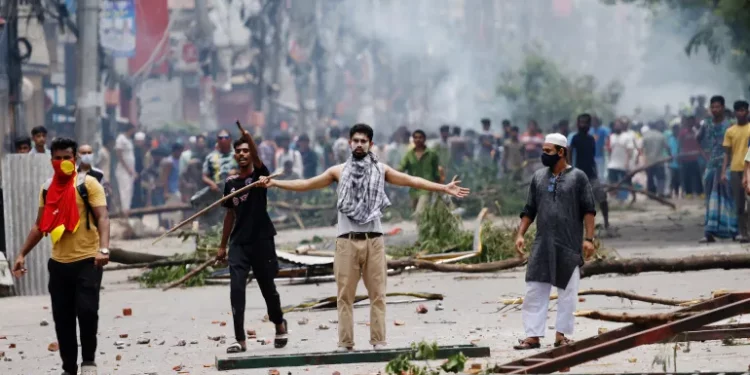Bangladesh’s highest court has curtailed the quotas for government jobs that ignited widespread student-led protests, resulting in over 100 fatalities.
On Sunday, the Supreme Court reversed a previous decision reinstating quotas for all civil service positions, which reserved 30% of jobs for veterans and their relatives from the 1971 war of independence. The new ruling limits these reservations to 5% for descendants of freedom fighters and an additional 2% for ethnic minorities and individuals with disabilities, opening the remaining positions to merit-based candidates.
The restoration of these quotas, originally abolished in 2018, sparked outrage among students. They argued that the quotas were unjust amidst economic decline and disproportionately favored individuals connected to the ruling Awami League, established by those who fought in the independence war.
Initial peaceful demonstrations on university campuses escalated into violence last week. Pro-government factions were accused of attacking protesters with weapons, while riot police deployed rubber bullets and teargas to disperse the crowds. Protesters retaliated with bricks and stones, stormed the state broadcaster’s headquarters in Dhaka, and set it on fire. In another city, they broke into a prison, releasing hundreds of inmates.
The violent clashes have resulted in thousands of injuries and approximately 150 deaths, although the government has not released official casualty figures. Eyewitnesses have claimed that police violence accounts for a significant portion of the deaths.
In response, the government has enforced a communications blackout, shutting down the internet and jamming phone lines. Authorities have arrested at least 70 opposition leaders and several student activists, accusing them of inciting unrest.
The country remains under a strict, indefinite curfew, with bans on leaving homes or gathering in any form. Police have been granted “shoot on sight” orders for curfew violators. Dhaka has taken on the appearance of a war zone, with military personnel and tanks patrolling the streets and helicopters flying overhead. Despite these measures, protests persist in parts of the capital.
Student organizers have declared that the Supreme Court’s ruling does not mark the end of their protests. The movement has evolved into the greatest challenge in years to Prime Minister Sheikh Hasina’s leadership, with calls for her resignation growing louder. Hasina, in office since 2009, faces accusations of authoritarianism and widespread corruption, and her re-election in January was marred by allegations of rigging.
















